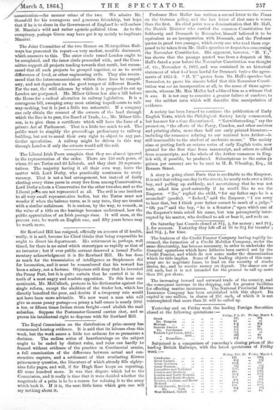The Joint Committee of the two Houses on Metropolitan Rail-
ways has presented its report—a very modest, sensible document, which amounts to this. The outer circle round London ought to be completed, and the inner circle proceeded with, and the Com- mittee support all projects tending towards that result, but recom- mend that all such projects be grouped together, so as to avoid differences of level, or other engineering evils. They also recom- mend that the intercommunication within these lines be compul- sory, and not dependent on the good temper of different Boards. For the rest, the wild schemes by which it is proposed to cut up London are postponed. Mr. Milner Gibson has also a bill before the House for a radical alteration in railway legislation. It is a courageous bill,' sweeping away most existing impediments to rail- way-making, but it is just a little too autocratic. If a company can only obtain the consent of the owners of the land through which the line is to pass, the Board of Trade, i.e., Mr. Milner Gib- son, is to give them a certificate which will have the force of a private Act of Parliament. That is a little too much to ask. The public want to simplify the proceedings preliminary to railway building, but not to annul their own right to object to any par- ticular speculation. A railway might be driven in this way through London if only the owners would sell the soil.






























 Previous page
Previous page